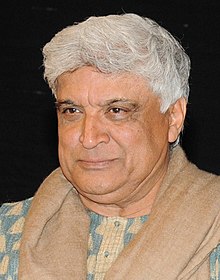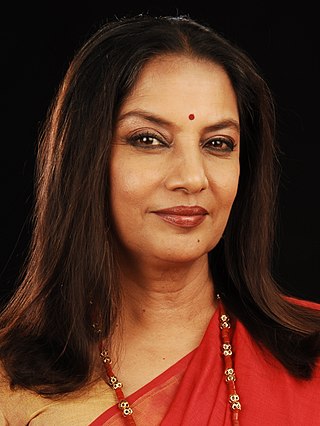
Shabana Azmi is an Indian actress of film, television and theatre. Her career in the Hindi film industry has spanned over 160 films, mostly within independent and neorealist parallel cinema, though her work extended to mainstream films as well as a number of international projects. One of India's most acclaimed actresses, Azmi is known for her portrayals of distinctive, often unconventional female characters across several genres. She has won a record of five National Film Awards for Best Actress, in addition to six Filmfare Awards and several international accolades. The Government of India honoured her with the Padma Shri in 1998 and the Padma Bhushan in 2012.
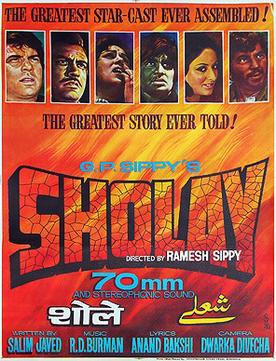
Sholay is a 1975 Indian Hindi-language action-adventure film directed by Ramesh Sippy, produced by his father G. P. Sippy, and written by Salim–Javed. The film is about two criminals, Veeru (Dharmendra) and Jai, hired by a retired police officer to capture the ruthless dacoit Gabbar Singh. Hema Malini and Jaya Bhaduri also star, as Veeru and Jai's love interests, Basanti and Radha, respectively. The music was composed by R D Burman.

Salim Abdul Rashid Khan is an Indian actor, film producer and screenwriter. He wrote the screenplays, stories and scripts for numerous Bollywood films. Khan is one half of the prolific screenwriting duo of Salim–Javed, along with Javed Akhtar. The duo were among the first Indian screenwriters to achieve star status in Hindi cinema, and became the most successful Indian screenwriters of all time. While working together, Salim Khan was largely responsible for developing the stories and characters, whereas Javed Akhtar was largely responsible for developing the dialogues.
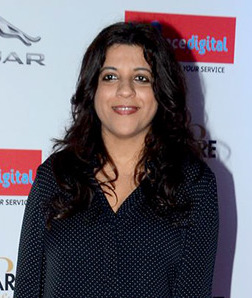
Zoya Akhtar is an Indian film director and screenwriter who works in Hindi cinema. Born to Javed Akhtar and Honey Irani, she completed a diploma in filmmaking from NYU and assisted directors Mira Nair, Tony Gerber and Dev Benegal, before becoming an independent writer and director. She is the recipient of several accolades, including four Filmfare Awards. Akhtar, along with Reema Kagti, founded Tiger Baby Films, a film and web studio in October 2015.

Salim–Javed were an Indian screenwriting duo, composed of Salim Khan and Javed Akhtar, who worked primarily in Hindi cinema. They were among the first Indian screenwriters to achieve star status, and are regarded as among "Hindi cinema's greatest screenwriters". They worked together on 24 films between 1971 and 1987, of which 20 were commercially and critically successful. According to film and music expert Rajesh Subramanian Salim Javed at the pinnacle of success were paid more than the lead actor and superstar Amitabn Bachchan for the film Dostana. Salim–Javed revolutionized Indian cinema in the 1970s, transforming and reinventing the Bollywood formula, and pioneering the Bollywood blockbuster format. A significant departure from the romance films that had previously dominated Bollywood, Salim–Javed were among the pioneers of cultural phenomena such as the "angry young man" character archetype, the masala film, the Dacoit Western genre, and Bombay underworld crime films. Their association lasted until 1982, when both decided to split after which Javed Akhtar moved into writing lyrics for around 80 films and scripts for 20 films from 1981 till present times, while Salim Khan wrote 10 film scripts between 1983 and 1996. They are credited together on two films after the split, Zamana (1985) and Mr. India (1987), due to these scripts being written earlier and made into film subsequent to their split. Their films had many South Indian remakes, which were often licensed directly from Salim–Javed, who owned the South Indian remake rights to their films.
Nasreen Munni Kabir is an India-born television producer, director and author based in the U.K. She is best known for producing an annual season of Indian films for the British terrestrial television channel Channel 4.

Prasoon Joshi is an Indian poet, writer, lyricist, screenwriter, communication specialist and marketer. He is the CEO of McCann World group India and Chairman APAC, a subsidiary of the global marketing firm McCann Erickson. He was appointed as the Chairperson of the Central Board of Film Certification on 11 August 2017.

Trishul (transl. Trident) is a 1978 Indian Hindi-language action drama film, directed by Yash Chopra, written by Salim–Javed and produced by Gulshan Rai. It features music by Mohammed Zahur Khayyam, with lyrics by Sahir Ludhianvi. The film features an ensemble cast of Shashi Kapoor, Sanjeev Kumar, Amitabh Bachchan, Hema Malini, Raakhee Gulzar, Poonam Dhillon, and Sachin, with Waheeda Rehman in a special appearance.
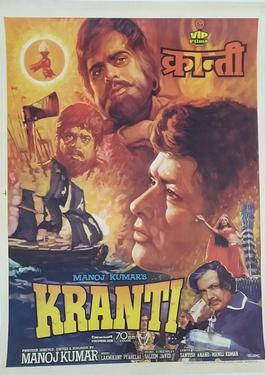
Kranti (transl. Revolution) is a 1981 Indian historical drama film, produced, edited, dialogue and directed by Manoj Kumar, with the story and screenplay written by Salim–Javed. It stars an ensemble cast, consisting of Dilip Kumar in the title role along with Manoj Kumar, Shashi Kapoor, Shatrughan Sinha, Hema Malini, Parveen Babi in pivotal roles. The film also marked the return of Dilip Kumar after a four-year hiatus. It ranks among the top 10 highest grossing Indian films of all time, when adjusted for ticket-price inflation. It was one of the most expensive Indian films of the time and it went on to become the highest grossing Indian film of the 1980s decade by a distance, when adjusted for inflation. Kranti is the biggest patriotic hit ever seen in India. It was the second highest grossing Indian film ever behind Sholay (1975) at the time of its release. However, it did higher business than Sholay in its original run. It grossed ₹20 crore as compared to ₹15 crore of Sholay in the original run. Sholay did exceptionally well in re-runs earning more profit in the meanwhile period.
Khairabad is a town in the Sitapur district of Uttar Pradesh state of India. It is 8 km from Sitapur on National Highway 24 in the Awadh region of India, about 80 km from the state capital Lucknow. A Municipal board conducts the affairs of the town.
The filmi-ghazal is a genre of filmi music based on ghazal poetry in Hindustani (Hindi-Urdu), used in Indian films, especially the music of Bollywood. The filmi-ghazals retain the couplet format and rhyme scheme similar to that in ghazals. However, instead of vocal or instrumental passages as interludes, the filmi-ghazal usually uses precomposed musical pieces.
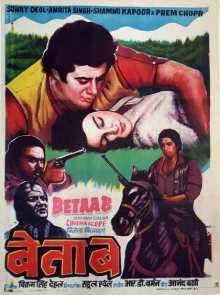
Betaab (Restless) is a 1983 Indian romance film written by Javed Akhtar, directed by Rahul Rawail and produced by Bikram Singh Dehal. The plot of the film was loosely based on William Shakespeare’s The Taming Of The Shrew. The film stars Sunny Deol and Amrita Singh in their debut roles along with Shammi Kapoor. The music was composed by Rahul Dev Burman. The opening of Betaab started in 1981 with the presence of Dilip Kumar, Saira Banu, Raj Kapoor, and Dharmendra. Before the release of Betaab, Sunny Deol also had a small role in the film Main Inteqam Loonga 1982 which his father Dharmendra was the hero of the film. Betaab was a commercial success and went on to be one of the biggest hits of the year, emerging as the 2nd highest grossing Indian film of 1983. The film was remade in Telugu as Samrat in 1987, with Ramesh Babu, in Bengali as Moner Manush in 1997 with Prosenjit and in Kannada as Karthik in 2011.

Masala films of Indian cinema are those that blend multiple genres into one work. Masala films emerged in the 1970s and are still being created as of the 2020s. Typically these films freely blend action, comedy, romance, and drama or melodrama. They also tend to be musicals, often including songs filmed in picturesque locations.

Gulzar is an Indian Urdu poet, lyricist, author, screenwriter, and film director known for his works in Hindi cinema. He is regarded as one of greatest Urdu poets of this era. He started his career with music director S.D. Burman as a lyricist in the 1963 film Bandini and worked with many music directors including R. D. Burman, Salil Chowdhury, Vishal Bhardwaj and A. R. Rahman. Gulzar also writes poetry, dialogues and scripts. He directed films such as Aandhi and Mausam during the 1970s and the TV series Mirza Ghalib in the 1980s. He also directed Kirdaar in 1993.

Iftikhar Hussain, known by his pen name Muztar Khairabadi, was an Indian Urdu poet.
The 6th Mirchi Music Awards, presented by the Radio Mirchi, honoured the best of Hindi music from the year 2013. The ceremony was held on 27 February 2014 and was hosted by Sonu Nigam. There were many performances, including those by Sunidhi Chauhan, Arijit Singh, Ankit Tiwari and Mika Singh, who gave a tribute to R. D. Burman for his 75th birth anniversary. Aashiqui 2 won a leading eight awards including Album of the Year and Song of the Year for "Tum Hi Ho".
The 4th Mirchi Music Awards, presented by the Radio Mirchi, honoured the best of Hindi music from the year 2011. The ceremony was held on 21 March 2012 at the Bhavan's College Ground (Andheri), Mumbai and was hosted by Shaan and Usha Uthup. There were many performances, including those by Saif Ali Khan, Parikrama, Shreya Ghoshal, Bappi Lahiri and Mika Singh. There was a live jugalbandi featuring Shankar–Ehsaan–Loy, Lalit Pandit, Salim–Sulaiman, Ram Sampath, Sajid–Wajid and Leslie Lewis. Ash King, Harshdeep Kaur, Neha Bhasin, Anushka Manchanda, Tochi Raina, Shweta Pandit, Dominique and Clinton Cerejo, Kamal Khan, Suman Shridhar, Shefali Alvares, Benny Dayal and Ritu Pathak also performed during the award show. Rockstar won a leading five awards including Album of the Year. Song of the Year went to "Senorita" from Zindagi Na Milegi Dobara. The show was broadcast on 31 March 2012 on Colors.
The 3rd Mirchi Music Awards, presented by Radio Mirchi, honored the best of Hindi music from the year 2010. The ceremony was held on 27 January 2011 at the Bandra Kurla Complex, Mumbai, and was hosted by Shaan and Sonu Nigam. The program featured many performances, including those by Bappi Lahiri, Usha Uthup, DJ Lloyd, Akshay Kumar, Anushka Sharma, Rishi Kapoor and Priyanka Chopra. Several award categories were introduced for the first time, including Best Indipop Song, Best Item Number, Best Raag Inspired Song, Best song in Sufi Tradition, and Best Album of Golden Era. Dabangg won a leading eight awards including Album of the Year and Song of the Year for "Munni Badnaam".
